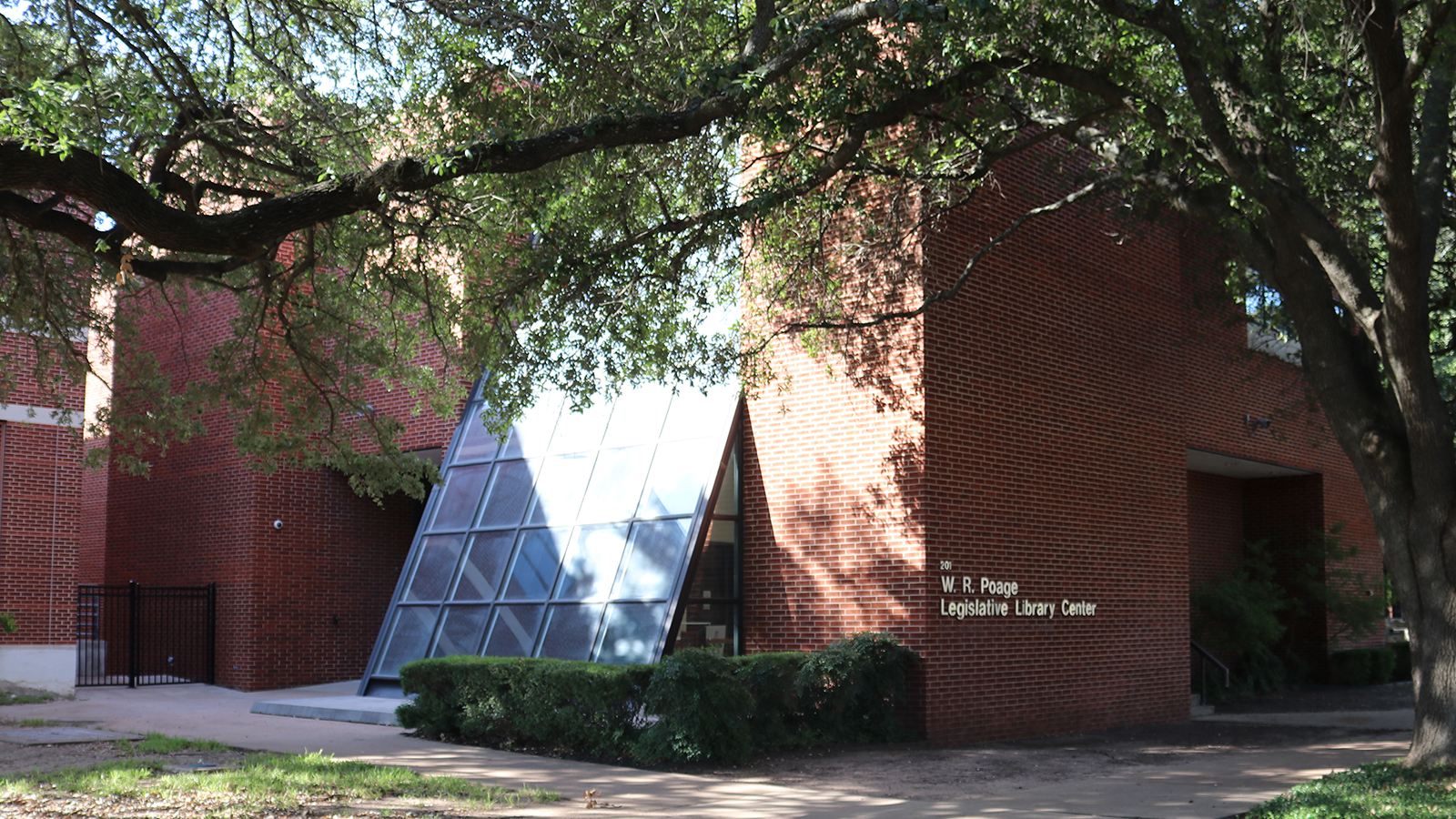Types of Materials Accepted
- Manuscripts
- Monographs
- Government Documents
- Reference Works
- Maps
- Audio-Visual Materials
Due to limited space for appropriate storage, BCPM generally excludes artifacts, framed items, and memorabilia unless they are integral to the mission of the repository. A select number of items may be accepted for exhibition purposes.
Strengths of the Collection
- Congressional Papers: Including congressional papers from U.S. Representatives from the 1940s to the present. The major subjects covered include agriculture, appropriations, foreign policy, and veterans.
- Texas Government: Several collections of state leaders and political parties are represented.
- Campaign Memorabilia: Local, state and national elections are documented.
Current Collecting Interests
Congressional Papers
- United States House of Representatives
- United States Senate
State and Local Government
- Civics leaders
- Elected officials
Bridge Collections
- Political parties
- Grassroots organizations
- Journalists and media consultants
- Public policy research
- Congressional scholars
Acquisitions
BCPM builds its holdings through donation or purchase. We actively seek materials and collections that build regional, national and internationally recognized collections, add significant rare and unique materials to the collections, and support academic programs.
Considerations for Acquisition
The following guidelines are considered when assessing potential acquisitions for BCPM:
- Stature on local, national or international scene;
- Content quality of the collection;
- Manageability of the collection; and
- Baylor alumni: Baylor alumni who have distinguished themselves in government service will also be encouraged to deposit their papers with the BCPM.
Limitations on Acquisitions
- No item may be added to the BCPM which cannot be stored, protected, and preserved under conditions that ensure its availability for research or exhibit purposes and that are in keeping with accepted professional standards.
- If an item, subsequent to acquisition, can no longer be properly stored or preserved or is harmful to other objects in the collection, appropriate action should be taken, including copying, disposal, or return of the item.
- No item may be acquired which is not intended as a permanent part of the collection.
- No item may be acquired with a commitment that it will be exhibited, that any special manner of exhibit will be followed, or that any area of the library will be named for a donor.
- Unsolicited donations must be evaluated in terms of their suitability and relationship to other holdings in the collection. Unsolicited donations that are not suitable or pertinent to the library should be returned to the donor with a suggestion of a suitable institution for deposit. If such materials are received by the action of a will, legal counsel should be consulted before attempting to return the items.
Gifts and Donation Policy
BCPM benefits from the generosity of alumni, faculty, and friends whose gifts enhance the quality and scope of our collection. We welcome and encourage gifts of selected materials that support the mission of BCPM. Due to space limitations and the cost associated with processing acquisitions, BCPM reserves the right to decline an offer of materials that duplicate items already in our collection, are in poor condition (especially if they exhibit signs of mold or mildew), carry restrictions, or fall outside the scope of our collecting policy. Materials that require considerable restoration or conservation, or unique storage can only be accepted if funds to support that activity accompany the gift.
BCPM also reserves the right to dispose appropriately of materials that, after receipt, are deemed unsuited to the collection or contain sensitive information such as social security numbers or financial documents with active accounts.
Potential donors should contact the Director of the BCPM.
Ownership
Once donated, gifts become the property of BCPM.
Acknowledgment
Donations to BCPM will be formally acknowledged in writing, and a record of the acknowledgment letter is maintained in our files. All donations will be accompanied by a Gift Receipt.
Copyright
Since the mission of the BCPM includes preserving and providing access to its collections, staff will create finding aids and frequently digitize original materials. These materials may be made accessible on the Internet. Therefore, whenever possible, a donor who holds the copyright to original materials should assign nonexclusive rights to BCPM. BCPM is not liable for infringement of copyright by patrons using our materials.
Valuation of Donations
It is important to note that it is the responsibility of the donor to keep accurate records describing the individual items donated and the value attached to each item. BCPM does not provide itemized lists of donations, nor do we appraise gifts. However, we may be able to facilitate locating an appropriate appraiser.
The IRS requires an independent appraisal if a donor plans to claim a charitable deduction above $5,000. Donors are encouraged to consult knowledgeable tax experts regarding current IRS regulations. IRS Publication 561, Determining the Value of Donated Property may be helpful.
Statement of Resource Sharing Policy
Duplication: BCPM will consider requests for duplication of materials for inclusion in another repository, subject to specific limitations imposed by the terms of acquisition and subject to the photoduplication policy of BCPM. Loans: Books in the BCPM will be considered for ILL on a case-by-case basis.
Exhibitions: Original manuscript materials may be loaned on campus for exhibits. Materials and facsimile reproductions may be loaned outside Baylor University if the recipient institution meets specific standards of the Director of BCPM for protecting and properly displaying the materials and the exhibit itself is compatible with the larger goals of the BCPM.
Procedures Affecting Collecting Policy
Deed of gift: BCPM will not accept materials without a legal transfer of title, Deed of Gift, Request for Deposit, or other official acknowledgment.
If a donor requests the return of materials for which there is a legal Deed of Gift, BCPM will consult the university legal counsel before making any decisions. Legally, the university does not have to return any item for which a Deed of Gift is on file.
Closed collections
Permanently: The BCPM will not accept collections that are permanently closed to public access by the donor. Temporarily: The BCPM will accept collections that are temporarily closed to public access by the donor, if it is a reasonable period of time.
Deaccession Policy
Deaccessioning is the process of permanently removing items from the collection after they have been assessed and determined that they no longer fulfill the needs of the institution. Deaccession in special collections is governed by principles different than those in general library deaccession.
When considering deaccessioning, the following criteria must be met as reflected in these questions:
- Does this item fall within the scope of current collection policies?
- Is this item of enduring value to the research needs of BCPM and its patrons?
- Is this item a duplicate or does it contain duplicate information found in another format?
- Has this item deteriorated beyond repair and usefulness?
- Does this item post a preservation hazard to other materials (e.g. active mold, insects, water damage, etc.)
- If damaged, can another copy of the same edition in better condition be acquired?
BCPM reserves the right to deaccession/sample any materials within its collections, subject to the terms of acquisition and the notification of the donor or his/her heirs.
Case files and military applications found in a collection are protected by federal privacy legislation and will be shredded.
Duplicate materials may be deaccessioned and either discarded, offered to another repository, returned to the donor or donor's family.
Revision of Policies
BCPM reserves the right to make changes in its policies as these seem reasonable and prudent. While every effort will be made to conform to the intent of the agreement made between the library and the donor at the time of accession, the library does not undertake to notify each donor of policy revisions.



